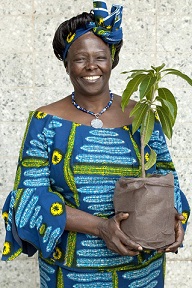Born on April 1, 1940, Wangari Maathai went on to become the first women in East Africa to earn a doctorate, gaining a PhD from the University of Nairobi in 1971. After graduation she taught at the Un
This is a short story of a Kenyan icon, the humming bird, Wangari wa Maathai
iversity of Nairobi, eventually becoming a chair of the Department of Veterinary Anatomy. She started The Green Belt Movement as a project of the National Council of Women of Kenya (NCWK), of which she was a member. Women had been coming to the NCWK complaining of deteriorating environmental conditions in their rural regions. With streams drying up, and poor harvests, women had to walk further and further afield in search of firewood. Within a few years, Prof. Wangari Maathai realized that the illegal and corrupt privatization of public land necessitated a more systematic and comprehensive approach to conservation. These activities brought Prof. Wangari Maathai into direct conflict with the Kenyan government. She was harassed, threatened, beaten, and jailed. Nevertheless, Prof. Wangari Maathai and GBM persevered, earning national and global recognition for her transformative work. Working tirelessly as a member of parliament and an assistant minister for the environment, she fought for women’s rights, democratic space, multipartyism, against corruption, land grabbing, and misogyny. From 2004 to her untimely death in 2011, Prof Wangari Maathai continued travelling the world campaigning for change. She urged action be taken on climate change, environmental justice, the protection of forests, good governance, participatory democracy, and women’s rights within Kenya. She touched the hearts of rural women, heads of state, people of every faith, in her community and across continents alike. Wangari Maathai’s legacy is exemplary of how one person can be a force for change.



0 Comments